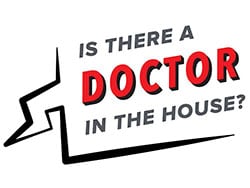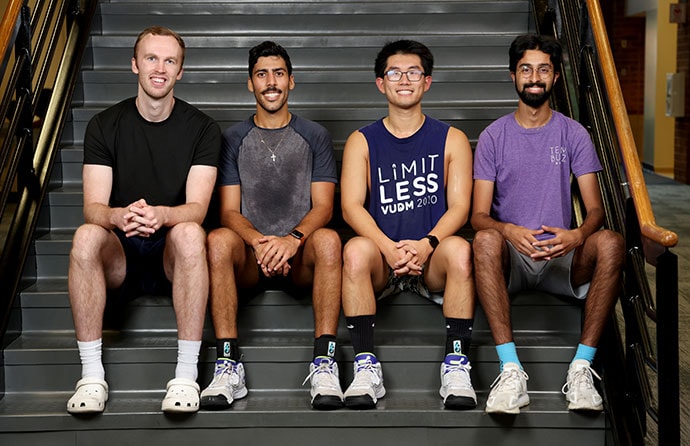
Emergencies happen anywhere, anytime, and sometimes medical professionals find themselves in situations where they are the only ones who can help. Is There a Doctor in the House? is a Medscape series telling these stories.
Brian Hou: We were clinical students on our rotations. It was the day before our very last shelf exam, and we wanted to decompress. A group of us played basketball together often, so we went to play a game at the rec center – Joel and I, Danny Ragheb, Shreyas Krishnapura, and Yash Pershad.
We were about 50 minutes in, and Danny tried to throw a pass. It hit the guy in front of him, and the guy doubled over in pain. People were laughing about it. And then Danny just dropped.
I was standing right next to him. I thought he was joking around at first, kind of mocking the other kid. But after five or six seconds, I realized something was off. He started having seizure-like movements in his hands. I tried to get his attention and he wasn't responding. I don't know what went through my head, but I just got down and did the only thing I knew how to do. I started doing CPR.
Joel, Shreyas, and Yash came to help, and then Shreyas went to call for the AED and an ambulance, which was a fantastic decision.
Daniel Ragheb: I don't remember much of this. But I know I wasn't mocking anyone!
Joel Johnson: When those 5 seconds passed, and Danny was in an awkward position on the ground, we knew immediately something was up. But Brian was the first person to get on CPR, and it was so fast. His reaction time was amazing.
Yash felt for a pulse and couldn't find one. Brian was doing compressions on Danny's chest. A gym worker ran over with an AED, which we got hooked up to him. They also brought us a little plastic mask to give him breaths. I don't know how effective it was.

Vanderbilt University School of Medicine student Daniel Ragheb, second from left, with classmates Joel Johnson, left, Brian Hou and Shreyas Krishnapura. Not pictured - Yash Pershad.
Brian Hou: Early on in our first year of med school, we had some basic life support training. But it had been over a year since then. This was it; this was our first time ever doing CPR on a real person.
I had assumed when I saw my first cardiac arrest, I'd be in a hospital. I'd have superiors who would be telling me what to do. We had to make the calls ourselves.
The four of us started rotating between doing compressions, checking for pulse, giving breaths, and just coordinating everything. In the moment, it was all a blur. The only thing I remember was thinking, He's going to make it. He'll be fine.
Joel Johnson: I always feared a situation like this. We learned CPR, but you never know when you're going to use that training. Like Brian, I felt like my mind was almost thoughtless. I recognized the situation was bad and that Danny could potentially die. But I wasn't really scared for some reason.
One of the weird, silly things I remember thinking was that it felt surprisingly similar to doing CPR on the mannequins. I didn't expect a real human chest to feel the same.
Brian Hou: We gave Danny three shocks over a course of 9 minutes. The first two shocks didn't really work. He would kind of come up, gasp for air, and then go back down. At one point, he was just motionless, which got us worried. But we kept on going. We didn't stop. And eventually he started coming back.
Joel Johnson: It was the weirdest thing. After the first two shocks, Danny would make some sort of moan, or try to sit up a little bit and push us away. But he still wasn't responding to any of our calls. He wasn't making purposeful movements. After the third shock, we knew he had his strength back, because he was able to push me off.
He still wasn't responding to anybody appropriately though. He was making these deep, guttural moans, as if he was in intense pain, which I'm sure he was. One of our friends pointed out later that it must be like having a car battery hooked up to your chest.
Daniel Ragheb: My chest was really sore. But I didn't have any broken ribs. I still tease them about that. I mean, did you guys really push as hard as you're supposed to?
Brian Hou: About 15 minutes later, EMS finally came and took over. Danny had started coming to and was sitting up. He was clearly in pain. He had also bitten his tongue and was bleeding from the mouth.
There was this huge adrenaline rush in the moment. Just chaos. And then once Danny was safely on his way to the hospital, that's when it hit us. We just thought, thank goodness he's okay.
Daniel Ragheb: My first solid memory is waking up in the emergency room and being surrounded by familiar faces — friends, classmates. The fellow on the cardiothoracic ICU rotation was someone I knew. The ER attending was one of my mentors. I had done research with the cardiologist. It was so comforting, knowing I was in really good hands, and I was going to be okay.
Brian Hou: The biggest thing was having Joel, Shreyas, and Yash there and working as a team. I know I wouldn't have been able to think through everything by myself. Especially remembering to call for the AED. In a class setting, the AED is right there.
The scary thing is that during our first year, the gym was shut down because of COVID. So, we mostly played at a park where there's probably no access to an AED.
Joel Johnson: That could've been disastrous. It was summertime. The weather was nice, and we could've decided to play outside that day.
Daniel Ragheb: I'm so grateful for a million things, but one of them is that it happened that day, in that place, with those people. There are so many other ways it could have occurred, and the outcome would've been very different.
Joel Johnson: It ended up being the perfect story for Danny's career, because he wants to be a heart surgeon someday. Brian wants to be a surgeon as well.
Daniel Ragheb: It definitely gave me a new perspective about treating patients after a sudden event like this. I'm able to say, "I know what you're going through. It's really hard. How can I help?" I feel more confident after having that life-changing experience myself. And during the long days, it reminds me that all this training has a concrete purpose.
Brian Hou: This was a problem: we didn't know exactly what the problem was, so we had to think on the spot and apply what we knew to a new situation.
Joel Johnson: I want to do anesthesiology where we deal with a lot of resuscitations. I had some nervousness about whether that acute mentality would kick in for me in an emergency. I think this proved to me that it will.
Brian Hou: Since then, we've worked with Danny on an initiative called HEART — hybrid education and AED resuscitation training for high school kids. It's something that means a lot to him.
Joel Johnson: They're high school students, so initially most of them weren't super interested in the class. They were just there because they had to be, a lot of chitchat going on. But when Danny dropped the fact that he had gone through cardiac arrest and that his peers had saved his life, the kids were instantly attuned to what he had to say. It's a really special position for Danny to be in, using his experience to make that impact.
Daniel Ragheb: I ask the kids, "How many of you can say that if this happened to one of your classmates, like it did to me, that you would be able to save their life?"
Brian Hou: I don't think they ever figured out exactly what caused Danny's cardiac arrest.
Joel Johnson: No, it was just a crazy, spontaneous thing.
Daniel Ragheb: The team taking care of me ultimately found no underlying reason why the event occurred. They felt confident that I would be able to return to doing the things I loved, such as surgery and sports. Their one condition was to place an internal defibrillator as a safeguard. I kept asking the doctors: "When can I play basketball again? When can I play volleyball? When can I start swimming? How about now?" When they finally cleared me, I felt pretty confident.
Brian Hou: If anything, he's better than before.
Joel Johnson: We were most happy that our friend was okay, obviously. But there was also an emotional high afterward. It reminded me why of we got into this — to make people healthy and to save lives. What an awesome privilege it is to do so.
Daniel Ragheb: Sometimes we forget that for the patient, this is a once-in-a-lifetime thing. The person saving their life is a hero. But our hope is that we can do it every day.
We want to be the ones in the room when a patient is in need. We eat, breathe, and sleep that. Since I was the patient, I'm going to call Brian, Joel, Shreyas, Yash, and every single person who took care of me heroic. But one day, God willing, when Brian and I are surgeons and Joel is an anesthesiologist, we'll go to work every day hoping to impact someone's life for the better. For the patient, it'll be a date they never forget. For us, it'll be Tuesday morning.
Daniel Ragheb, Brian Hou, and Joel Johnson are fourth-year medical students at Vanderbilt University School of Medicine.
Are you a medical professional with a dramatic story outside the clinic? Medscape would love to consider your story for Is There a Doctor in the House? Please email your contact information and a short summary to access@webmd.net .
Read more in the series:
What Can You Do During a Mass Shooting? This MD Found Out
In 133-Vehicle Pile-Up, Bleeding Paramedic Helps While Hurt
A Death Valley Crisis Forces an MD to Use All Her Training
MD Rushes in After Lightning Strikes Four People at White House
Sudden Bedtime Aneurysm Turns MD Couple into Doctor-Patient
For more news, follow Medscape on Facebook, X (formerly Twitter), Instagram, YouTube, and LinkedIn
Credits:
Lead image and logo: Medscape
Image 1: Donn Jones
Medscape Medical News © 2023 WebMD, LLC
Send news tips to news@medscape.net.
Cite this: First-Time CPR: Med Students Jump in to Save a Friend - Medscape - Sep 19, 2023.








Comments